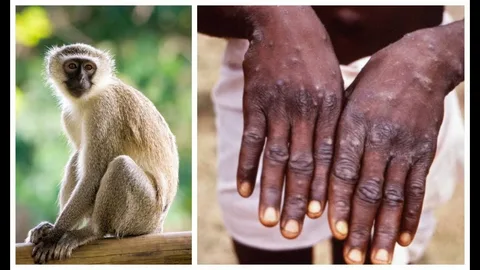Monkeypox Outbreak Emergency
The World Health Organization (WHO) has declared the recent surge in mpox cases in the Democratic Republic of the Congo (DRC) and other African nations as a Public Health Emergency of International Concern (PHEIC). This decision, made by WHO Director-General Dr. Tedros Adhanom Ghebreyesus, follows the advice of an Emergency Committee composed of independent experts who reviewed data from the WHO and affected countries.
The committee expressed serious concern about the escalating mpox situation, noting its potential to spread beyond Africa. Dr. Tedros emphasized the urgency of the situation, highlighting the emergence of a new mpox strain, Clade 1b, which has been rapidly spreading in eastern DRC and neighboring countries. This new strain, combined with ongoing outbreaks of other mpox clades, demands a coordinated international response to prevent further spread and save lives.
Dr. Matshidiso Moeti, WHO Regional Director for Africa, confirmed that efforts are already underway in collaboration with communities and governments. WHO country teams are actively working on the frontlines to strengthen measures aimed at controlling the spread of mpox. With the virus spreading across borders, WHO is scaling up its response to support affected countries and bring the outbreaks under control.
Professor Dimie Ogoina, Chair of the Emergency Committee, underscored the global significance of the mpox upsurge, stating that it poses an emergency not just for Africa but for the entire world. He pointed out that mpox, which originated in Africa, was previously neglected until it caused a global outbreak in 2022. Ogoina called for decisive action to prevent a repeat of history.
This marks the second time in two years that a PHEIC has been declared for mpox. The disease, caused by an Orthopoxvirus, was first identified in humans in 1970 in the DRC and is considered endemic in central and west African countries. In July 2022, a multi-country outbreak of mpox was declared a PHEIC after it spread rapidly through sexual contact in regions where the virus had not been previously reported. That PHEIC was lifted in May 2023 after a sustained decline in global cases.
Mpox has been a persistent issue in the DRC for over a decade, with the number of reported cases rising steadily each year. Last year saw a significant increase in cases, and this year has already surpassed that total, with over 15,600 cases and 537 deaths reported.
The emergence and rapid spread of Clade 1b, particularly through sexual networks, in the DRC and its detection in neighboring countries such as Burundi, Kenya, Rwanda, and Uganda, has heightened concerns. In the past month alone, over 100 laboratory-confirmed cases of this new strain have been reported in these four countries, which had not previously recorded any mpox cases. Experts believe the actual number of cases to be much higher due to under-testing.
Several mpox outbreaks, involving different clades and transmission methods, have been reported in various countries, each presenting different levels of risk.
Currently, two vaccines are recommended for mpox by WHO’s Strategic Advisory Group of Experts on Immunization. These vaccines are also approved by WHO-listed national regulatory authorities and individual countries, including Nigeria and the DRC.
To accelerate vaccine access for lower-income countries, WHO has initiated the Emergency Use Listing process for mpox vaccines. This will enable partners such as Gavi and UNICEF to procure and distribute vaccines. WHO is also collaborating with vaccine manufacturers and coordinating with partners through the interim Medical Countermeasures Network to ensure equitable access to vaccines, therapeutics, diagnostics, and other necessary tools.
WHO has identified an immediate funding requirement of $15 million to support surveillance, preparedness, and response activities. An ongoing needs assessment across WHO’s three levels will help determine the full extent of resources required. To facilitate an immediate scale-up, WHO has already released $1.45 million from its Contingency Fund for Emergencies, with the possibility of additional funds being released in the coming days. WHO is also appealing to donors to fully fund the mpox response efforts.



